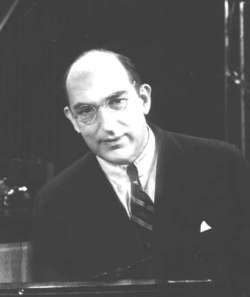Sigmund Spaeth
Sigmund Gottfried Spaeth (April 10, 1885 – November 12, 1965) was an American musicologist who traced the sources and origins of popular songs to their folk and classical roots. Presenting his findings through books, lectures, liner notes, newspapers, radio and television, he became known as The Tune Detective.

Biography
Spaeth was born in Philadelphia, Pennsylvania and attended Haverford College (where he composed the "Haverford Harmony Song")[1] and went to Princeton where he did his Ph.D. thesis on "Milton's Knowledge of Music." He taught school and worked for Life, The New York Times, the Evening Mail and the Boston Evening Transcript.
He composed the music score for the silent film The Magic Flame (consided lost), with Ronald Colman and Vilma Bánky; and wrote the lyrics of one of the songs in The Trespasser (1929), the talkie debut of Gloria Swanson. His books include Read 'Em and Weep, Weep Some More, My Lady, A History of Popular Music in America, The Common Sense of Music, Fifty Years With Music, The Importance of Music and Stories Behind the World's Greatest Music.
On NBC his program of piano instruction, Keys to Happiness (1931), brought an avalanche of 4000 fan letters each week. In November, 1931 he began his 15-minute NBC program, The Tune Detective, airing Tuesdays at 10pm and continuing until 1933. Beginning in 1932 NBC also carried his Song Sleuth which was heard Thursdays at 8:15pm. On Mutual he did Sigmund Spaeth's Musical Quiz on Sunday afternoons at 1:15pm from January 19 to March 23, 1947. He also appeared on Metropolitan Opera Quiz.
He was a charter member of the Iota chapter of Phi Mu Alpha Sinfonia at Northwestern University. He was awarded the 1958 Charles E. Lutton Man of Music Award for his contributions.
Spaeth died in New York City, New York at the age of 80.
Bibliography
Books
- Spaeth, Sigmund (1926). Words and Music: A Book of Burlesques. New York: Simon & Schuster.
- Spaeth, Sigmund, ed. (1952). Music and Dance in the Southeastern States, including Florida, Georgia, Maryland, North & South Carolina, Virginia & the District of Columbia. New York: Bureau of Musical Research.
Essays and reporting
- S. S. (February 21, 1925). "A New York dictionary". The New Yorker. 1 (1): 30.
- — (February 28, 1925). "Echo". Art. The New Yorker. 1 (2): 19.
- — (March 7, 1925). "What a young man should know". The New Yorker. 1 (3): 12.
- — (March 14, 1925). "Notes from the Metropolitan". The New Yorker. 1 (4): 25.
- — (March 21, 1925). "Information, please". The New Yorker. 1 (5): 21.
- — (April 4, 1925). "Under the palm trees". New York, Etc. The New Yorker. 1 (7): 23.
- — (April 11, 1925). "Speaking of publicity". The Sky-Line. The New Yorker. 1 (8): 29.
- — (April 25, 1925). "Notes of a traveling man". The New Yorker. 1 (10): 21.
- (August 1928). "Jazz is not music." Forum: the magazine of controversy. 80 (2): 267-271.
References
- Raber, Rebecca (27 September 2017). "Curt Cacioppo Honors "Lives That Speak" In Song". Retrieved 17 February 2020.
External links
- Sigmund Spaeth at Find a Grave
- Sigmund Spaeth on IMDb
- "Tune Detective," Time, August 22, 1932, (paid subscription required)
- Sigmund Spaeth - Remington Records: Music Plus Series